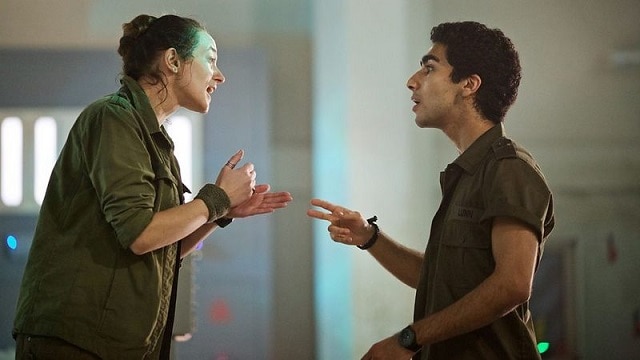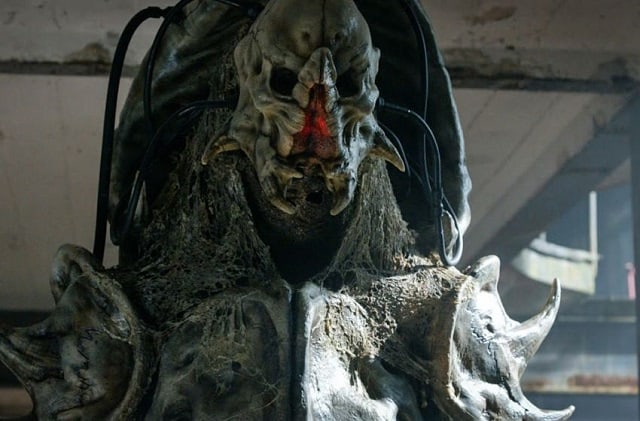Doctor Who, Series 9, Episodes 3 and 4, “Under the Lake” and “Before the Flood”
Written by Toby Whithouse
Directed by Daniel O’Hara
Airs Saturdays at 9pm (ET) on BBC America
Multi-part stories have been a mixed bag in Doctor Who since its 2005 revival. When they work (series two’s “The Impossible Planet”/“The Satan Pit”, series five’s “The Pandorica Opens”/“The Big Bang”), the increased runtime allows for greater character development and world-building, plus a much more affecting emotional payoff in the stories’ climax. When they don’t, however—let’s hope the show never tops series one’s “Aliens of London”/“World War Three” for unfortunate two-parters—the audience is left to slog through an overlong, under-developed, and frequently repetitive story better left at one episode. Series nine will feature four multi-part stories, the most since the show’s return, and while the opening two-parter ultimately struggled with overly familiar themes and lazy writing (after a mostly promising premiere), it is improved upon by “Under the Lake”/“Before the Flood”, which highlights the strengths of the form.
Often in Doctor Who, standalone episodes that take the time to build atmosphere and mood wind up rushed in their third act, explanations hand-waved away and confrontations hurried to finish in the allotted time. “Under the Lake”/“Before the Flood” takes full advantage of its extended runtime to establish the spooky feel of the underwater base, the threats faced by The Doctor, Clara, and the crew, and the interpersonal dynamics of the team, ensuring that viewers care when they start getting picked off. While “Before the Flood” is a bit thin on plot for Clara and her compatriots, who basically sit around and wait to be rescued, there’s enough happening visually and the characters are engaging enough that the audience is happy to spend time with them, puzzling out what’s happening while they do the same. And unlike the denouement of “The Witch’s Familiar”, the answers given in “Before the Flood” are all there for viewers to find; the episode invites fans to play along without cheating at the end.
As is frequently the case in two-parters, the first episode, “Under the Lake”, is the stronger installment, building character dynamics and having fun with the group’s reactions to what even The Doctor admits might as well be ghosts. The direction of Daniel O’Hara builds suspense and dread, the camera staying close on the cast as they creep through the poorly lit, maze-like corridors during Night Mode, taking turns baiting the ghosts. O’Hara, as well as the script from Toby Whithouse, makes good use of the porthole windows throughout the base, drawing the audience’s eyes directly to the characters’ faces as they frantically communicate through the doors or peer out into the darkness. The stakes may take a while to kick into full gear, but there’s a strong enough rapport between the crew that the loss of their teammates is felt (and it helps that it’s been a while since Doctor Who played the zombie/ally-turned-foe card). While there’s never a real sense of danger for The Doctor—as mentioned in my review of “The Magician’s Apprentice”, everyone watching knows he won’t die for realsies, so any attempts to return to that well fall flat—his floating up to end part one is effective nonetheless, an ominous portent of a tough part two to come.

As in part one, O’Hara takes advantage of his extra time to give part two stylistic flourishes. The sequence following Cass down the base corridor as the ghost of Moran stalks behind her is incredibly tense, and dropping out the sound to put the audience in her POV works well. This is the only moment in which her deafness is shown to be a liability, and shortly thereafter, Whithouse recasts it as a strength, having her reach down and feel the vibration of Moran’s ax along the floor—a moment effectively realized by the sonar-esque visuals—and then turn just in time to dodge the ax and disperse Moran by running through him; the ghost underestimates his target due to her deafness, giving her the upper hand. The Doctor may leap a bit too quickly to the presumption that he will die—why would he assume The Fisher King or ghosts will not only kill him, but somehow rob him of all future regenerations, when it being a ruse is such a simpler and more rational assumption?—but Peter Capaldi sells The Doctor’s concerned reaction and Clara’s response, that the next Companion can deal with The Doctor’s death, because she sure as hell won’t (the subtext in her words, to this critic: not again), is fantastic, if only for showing Clara’s clear-eyed view of her important, but not permanent place in The Doctor’s life.
Not everything works in “Before the Flood”, and a particular pet peeve is the series’ recent penchant for introducing, then needlessly killing off fans of The Doctor just after they’ve proven their mettle as Companions. However, on the whole it’s a satisfying conclusion to the entertaining “Under the Lake”, and the comparatively quiet ending, with The Doctor speculating with Clara over the paradox of his solution to the mystery, is a welcome antidote to the grandiose twists and counter-twists of “The Witch’s Familiar”. There’s still room to improve, but “Under the Lake”/“Before the Flood” is the show’s most effective two-parter since the fantastic (if morally problematic) series six premiere, and with two more on the way this season, it’s an encouraging sign of what viewers may have to look forward to.
- While the notion of The Twelfth Doctor finding Beethoven to be, “a nice chap” feels incredibly odd—maybe they bonded over their equally huge egos? I feel like they’d be a bit too similar in certain ways to get along too well—I adored the shoutout to Beethoven’s Fifth and the guitar-heavy take on the theme.
- Glad to have one of the more interesting and unique aliens/alien cultures of NuWho return, the Tivolians!
- Credit to Whithouse for coming up with a new delivery for, “It’s bigger on the inside!”. That cannot be easy at this point.
- “Before the Flood” repeating a scene with The Doctor watching himself and holding back a Companion(ish) from interfering in the timeline gave me massive “Father’s Day” feels; it’s still one of the series’ most affecting episodes, for me at least.
- The Doctor creating a bootstrap paradox doesn’t bother me. Him saying the names of the ghosts in the order the audience saw the deaths happen, rather than the order they happened—Prentis should have been first—does.
- Doctor Who has done the base under siege story over and over again; it’s one of their most reliable go-tos. The good versions make me glad to see the form again, the bad ones make me wish I were watching the good ones (in NuWho, “The Impossible Planet”/“The Satan Pit” and “Silence in the Library”/“The Forest of the Dead”, for starters). While this one isn’t quite up to the high standard of Who’s best base under siege stories, it’s a solid entry, and certainly much stronger than many of their recent efforts in the subgenre.
- The Sonic Sunglasses are still stupid.
- Next week, Maisie Williams!


